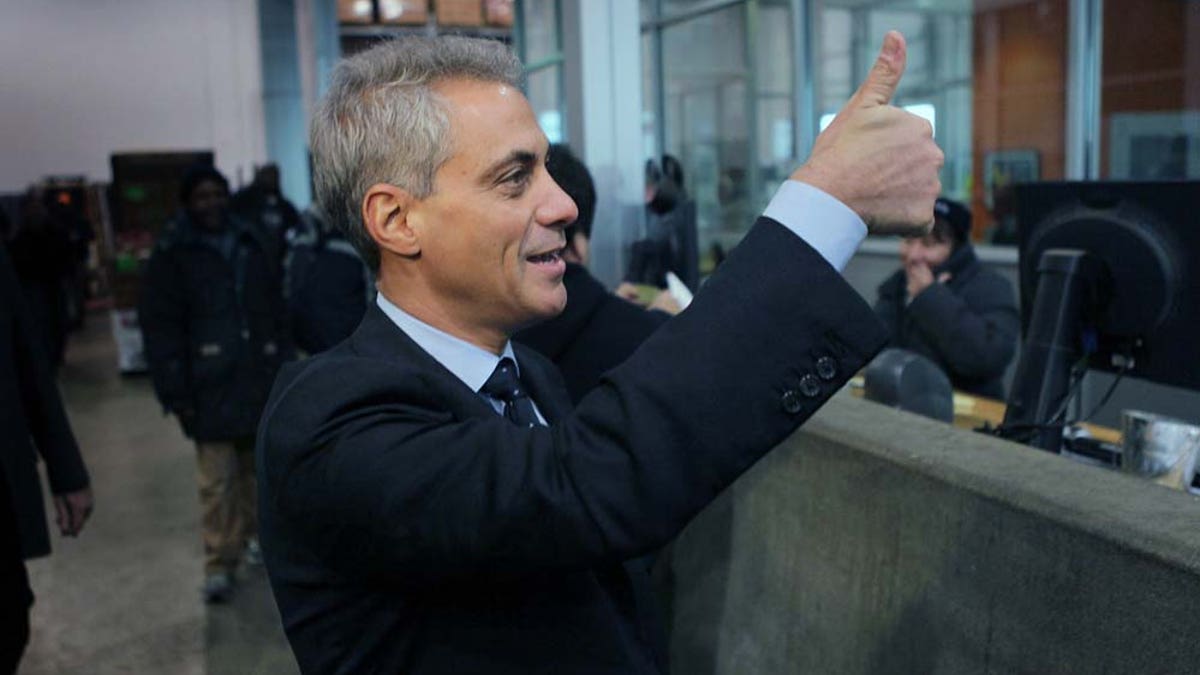
CHICAGO, IL - JANUARY 25: Mayoral candidate and former White House Chief of Staff Rahm Emanuel gives teh thumbs up at a produce distribution warehouse where he received the endorsement of Teamsters Joint Council 25 on January 25, 2011 in Chicago, Illinois. According to reports, Emanuel has been placed back on the Chicago Mayoral ballot after the Illinois Supreme Court issued a stay on an Illinois Appellate Court decision that he didn't meet Chicago residency requirements to run for mayor. (Photo by Scott Olson/Getty Images) (2011 Getty Images)
Rahm Emanuel, whose front-runner mayoral campaign got tripped up when his residency again came under scrutiny, will be allowed to continue his quest to become mayor of Chicago, the Illinois Supreme Court ruled Thursday.
The former White House chief of staff, whose candidacy had been ruled ineligible by a state appellate court, will have his name on the Feb. 22 ballot after the state’s highest court decided he had met the living requirements to run.
"As I said from the beginning, I think the voters deserve the right to make the choice of who should be mayor," Emanuel said shortly after getting word of the high court's action. "I'm relieved for the city. I'm relieved for the voters because they need the certainty that's important for them," he said.
The seven justices overturned a ruling made by a state appeals court on Monday that kicked Emanuel off the ballot. The appellate court had decided Emanuel had not lived in Chicago for a year before the election.
The decision capped a whirlwind 48 hours during which Emanuel – whose star power, fundraising and early polling had drowned out his opponents – seemed vulnerable for the first time in the campaign. Emanuel’s legal woes gave other mayoral hopefuls, including Latino candidates Gery Chico and Miguel del Valle, a glimmer of hope on Monday.
But the chance to grab the spotlight was short-lived. By Monday evening, the state Supreme Court had issued a stay on the appellate court’s ruling, allowing Emanuel’s name to be placed on the ballot. Some 24 hours later, the highest court agreed to hear his case.
Chico and del Valle released statements after the court made its decision.
“I am glad this question has finally been resolved," del Valle said.
"As I have said throughout my campaign, this has served as a real distraction that has kept people from focusing on the issues that are of concern to the neighborhoods of the city of Chicago--our neighborhood schools, public safety, and fixing our budget deficit," he said.
Chico sounded a similar tune. "Emanuel's residency drama has made this election into a circus instead of a serious debate about the future of Chicago," he said.
"Now that the Supreme Court has made their decision, the residents will choose their next mayor based on the candidates' track records and their vision for Chicago," Chico said.
The court's opinion stated there are two required elements to establish residency.The physical presence of the candidate and "an intent to remain in that place as a permanent home."
It continued that "once residency is established, the test is no longer physical presence but rather abandonment, the presumption is that residency continues, and the burden of proof is on the contesting party to show that residency has been abandoned."
With respect to Emanuel, the court's opinion states that the "candidate testified that his intent was not to abandon his Chicago residence [and] his acts fully support and confirm that intent."
Emanuel told several friends that he intended to serve as Chief of Staff for no more than 18 months or two years before returning to Chicago.
The non-partisan primary is scheduled for Feb. 22.
The decision appears to close the book on Emanuel’s disputed residency, a stumbling block in an otherwise fast-moving campaign. Emanuel has reportedly raised up to $12 million, was supported by more than 40 percent of respondents in a recent poll, and had received key endorsements, including the backing of former President Bill Clinton.
The ruling is a crippling setback for Emanuel’s opponents, particularly for Chico and del Valle. The Latinos are vying to become the Windy City's first Hispanic mayor.
Chico and del Valle, along with former U.S. Rep. Carol Moseley Braun, were the likely beneficiaries had the appellate court’s ruling held up.
Chico, in particular, stood to gain the most from an Emanuel departure. The former chief of staff to outgoing Mayor Richard Daley, who also once served as president of the city’s public schools, has snagged endorsements from key police and fire unions, not to mention a nod from Rep. Luis Gutierrez.
Experts said he likely would have provided the softest landing for displaced whites and business leaders who had thrown their resources behind Emanuel.
Del Valle, too, was in line to scoop up black and Latino voters who had backed Emanuel. The 59-year-old Puerto Rican – the progressive and self-proclaimed “poorest” candidate in the field – could have siphoned off those voting blocs and had less competition to woo those communities of color who remain decided.
Follow us on twitter.com/foxnewslatino
Like us at facebook.com/foxnewslatino











































